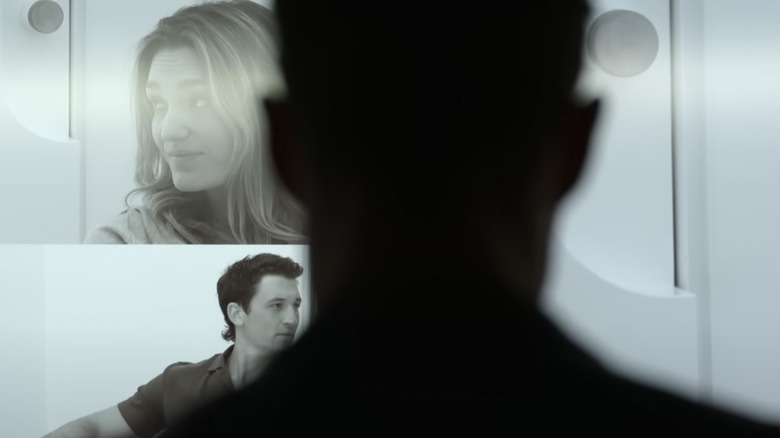How Spiderhead's Writers Brought A Bit Of Deadpool And Zombieland Into The Movie
Netflix's "Spiderhead" focuses on a top secret facility where convicted felons volunteer for drug trials to escape time in a traditional prison. The film offers a roller coaster ride of emotions thanks to tactless comments, awkward dancing, and handy dandy MobiPacks provided by Steve Abnesti (Chris Hemsworth). Abnesti is the villain of the film, a psychopath who gets off on manipulating emotions and commanding obedience, but that doesn't mean he can't bring a little humor to the story.
When Rhett Reese and Paul Wernick, the writing partners behind "Zombieland" and "Deadpool," were tapped to adapt Greg Saunders' short story "Escape from Spiderhead" into a movie, they weren't shy about injecting their own style into the film adaptation. A story about chemically manipulating the thoughts and feelings of reluctant "volunteers" isn't exactly synonymous with humor, but neither is the zombie apocalypse or cancer, which are two topics the writing team has previously infused with levity.
Traditionally, the writers use comedy and violence to create murky characters and an ambiguous tone, but they found a new way to use that style in their latest film. In an interview with Polygon, Reese and Wernick explained how "Spiderhead" continues and broadens their style of blending violence, horror, and humor to create a complex character and story.
Same muscles, same murky tones
Reese and Wernick's most successful films concentrate on the well-explored (and some might say exhausted) genres of superhero and zombie films. However, their movies include a unique blend of violence, action, and comedy. In a world bursting with boy scout Marvel heroes, Reese and Wernick introduced Deadpool, an antihero who drops double entendres while destroying enemies with motorcycle chains and cigarette lighters. And their zombies aren't the menacing walkers we've become accustomed to either. The undead in "Zombieland" pick the flesh from their teeth and burp after devouring a man alive.
With every combination of quip and decapitation, the writers beg us not to take anything too seriously, which makes the gore of devouring humans and the ridiculousness of Deadpool's fight scenes a lot easier to swallow. With such a tongue in cheek style, Reese and Wernick seem an unlikely choice for a sci-fi drama.
"Spiderhead" is drastically different from the zombie apocalypse of "Zombieland" or the wisecracking superhero, "Deadpool," but Reese found that the writing process is similar:
"To use a bad metaphor, it kind of feels like we're doing a different exercise at the gym, but on the same muscles, to hit them from a different way. So it's not that different, it's sort of a half-step different. It's just shades, right? I mean, our tone is always a little murky. Oftentimes we'll have violence and comedy mixed together, and yet heart and love. I feel like this falls into that general area. It's got a love story, it's got real emotions. At times, it is funny, it's just a little darker."
The writing process might not have been very different, but the character that Reese and Wernick created certainly was.
Dark Dancing
Like Deadpool, Abnesti is a blend of violence and comedy, but the combination works in a completely different way. Armed with a charismatic smile, a secret top notch facility, and the guide of a "volunteer" program, the scientist spends his days manipulating emotions and manufacturing consent. Like a lot of Reese and Wernick's characters, there's a darkness behind the scientist's practiced smile, but it's not so easily tamed with humor. Abnesti is not a burping zombie or wisecracking antihero, he is a villain, and Reese and Wernick use comedy to deepen his darkness. Abnesti is a brilliant scientist with a massive ego, who is willing to do anything to test his wonder drugs. His experiments become increasingly cruel, eventually causing the death of a young woman, but Abnesti's emotions are untouched by all of it.
By day, he conducts dangerous and humiliating experiments on his victims and spends his nights dancing around to Supertramp and cheesy '80s pop songs while tripping on his own drugs. "Deadpool" and "Zombieland" use comedy to undercut violence and horror, but "Spiderhead" uses it to enhance the cruelty and psychosis of Abnesti. Watching the scientist flutter around his room to upbeat music, shortly after violating the minds and bodies of his test subjects, shows just how depraved and emotionless he really is. Sure, it's funny to watch the God of Thunder glide around his bedroom, but this isn't the equivalent of a clever remark that'll make us forgive Deadpool for torturing his victims. This is Buffalo Bill dancing in front of a mirror while keeping an innocent girl in a well.
With a careful splattering of humor, Reese and Wernick made a pharmaceutical rep feel more dangerous than zombies or a sword-wielding mercenary.
Evolved style
Reese and Wernick's expert blend of comedy, gore, and stylish action sequences will always provide a much needed escape from reality and boredom, but it's always refreshing to watch creative styles change and evolve. In this film, instead of creating lovable neutral characters living in a tongue-in-cheek world, the writers use humor to emphasize the cruelty and selfishness of a villian.
For years, Reese and Wernick have used humor to make us cheer for antiheroes and laugh at apocalypses, and like Steve Abnesti, they continue to explore new and interesting ways to manipulate our emotions.



